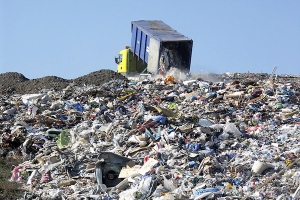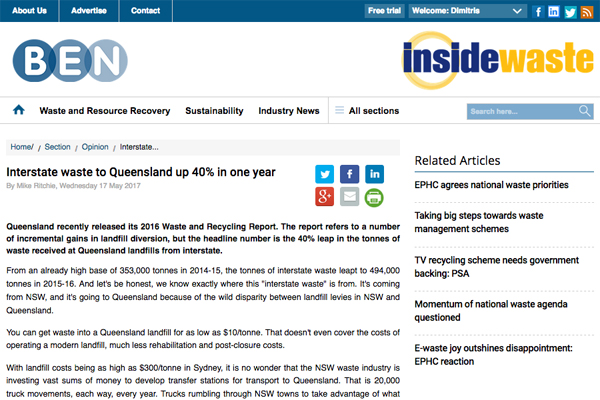Interstate waste to Queensland up 40% in one year
By Mike Ritchie, MRA Consulting Group
Queensland recently released its 2016 Waste and Recycling Report. The report refers to a number of incremental gains in landfill diversion, but the headline number is the 40% leap in the tonnes of waste received at Queensland landfills from interstate.
 From an already high base of 353,000 tonnes in 2014/15, the tonnes of interstate waste leapt to 494,000 tonnes in 2015/16. And let’s be honest, we know exactly where this “interstate waste” is from. It’s coming from NSW, and it’s going to Queensland because of the wild disparity between landfill levies in NSW and Queensland.
From an already high base of 353,000 tonnes in 2014/15, the tonnes of interstate waste leapt to 494,000 tonnes in 2015/16. And let’s be honest, we know exactly where this “interstate waste” is from. It’s coming from NSW, and it’s going to Queensland because of the wild disparity between landfill levies in NSW and Queensland.
You can get waste into a Queensland landfill for as low as $10/tonne. That doesn’t even cover the costs of operating a modern landfill, much less rehabilitation and post-closure costs.
With landfill costs being as high as $300/tonne in Sydney, it is no wonder that the NSW waste industry is investing vast sums of money to develop transfer stations for transport to Queensland. That is 20,000 truck movements, each way, every year. Trucks rumbling through NSW towns to take advantage of what will ultimately prove to be a one-off blip in waste pricing. Even the waste operators taking advantage of this price discrepancy are calling for it to stop.
The current situation is not the fault of the NSW Government. NSW is taking steps to develop a viable, local resource recovery industry. Landfill levy is a core element in ensuring that resource recovery can compete against cheap landfill, both increasing landfill costs and providing funds for waste projects. NSW will invest $802m of levy funds over eight years into the waste industry.
Queensland has taken a different view, deciding that the jobs that come with local recycling are less important than the marginal savings in rates for Councils from cheap landfills. That it would rather leave a legacy of underfunded landfills for future generations to clean up, than have current generations invest in the future. The likely outcome will be that Queensland taxpayers are left with “millions upon millions” of landfill liabilities, as happened in Melbourne.
The net outcome is that the NSW government is missing out on between $38m and $67m in landfill levy, the Pacific Highway is getting worn out, people travelling on these roads are exposed to a higher risk of injury in a crash. At the same time, future Queenslanders are being lumbered with a very substantial liability.
NSW has tried to take action with its proximity rule, however that proved unviable. Not only was it difficult to enforce but also regulation banning the movement of waste interstate is prohibited under s.92 of the Australian Constitution. It needs agreement between all of the states and territories to make it happen.
We understand that NSW is pushing for consensus from the other states to prohibit interstate transport of waste (with presumably a very short list of exemptions for specialised hazardous wastes and landfills at the border serving local communities).
How long does it need to take? Which state is holding it up, and what will it take for this situation to change? Will it require even more NSW recyclers to go broke? Innocent drivers to be killed by one of the trucks hauling to Queensland? An environmental disaster at one of the recipient landfills?
It’s time for the states to get on with it. Prevent the interstate movement of waste, and let local processors build their business with some certainty. The industry is ready and waiting.
As always, I welcome your feedback on this, or any other topic on ‘The Tipping Point’.
Image credit: maol, Flickr CC BY-NC-SA 2.0.
This article has been published by the following media outlets:




